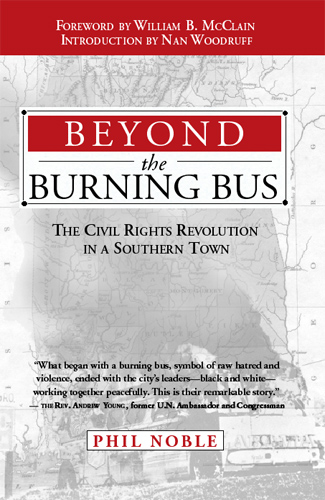Student Freedom Riders to talk Beyond the Burning Bus with Phil Noble
Wednesday, April 20th, 2011 by Sam Robards
NewSouth Books would like to commend the journey of the 2011 Student Freedom Ride, which will mark the 50th anniversary of the Freedom Rides through the South. The program is composed of 40 college students from over 30 states, chosen by American Experience, whose goal is to spark a national debate concerning the role of civic engagement in today’s society.
The group will travel the course laid out by the original Freedom Rides, arriving in Anniston, Alabama, on May 11. While there, they will meet Rev. J. Phillips Noble, who will give the riders autographed copies of his book, Beyond the Burning Bus: The Civil Rights Revolution in a Southern Town, which discusses the effects of the Anniston bus bombing of 1961 on that small Southern town. The tour will then journey onward until they reach New Orleans, Louisiana, on May 16 for the premiere of the film Freedom Riders on PBS.
The 2011 Student Freedom Riders include: Maricela Aguilar, Liliana Astiz, Stephanie Burton, Meghna Chandra, Sarah Cheshire, Michellay Cole, Collis Crews, William Dale, Peter Davis, Rajlakshmi De, Rachael DeMarce, Francisco Diaz, Doaa Dorgham, JoyEllen Freeman, LeRoy Ford, Lu-Anne Lopez Haukaas, Marshall Houston, Bakhrom Ismoilov, Esther Kim, Davis Knittle, Diana Mahoney, Jason McGaughey, Tariq Meyers, May Mgbolu, Anna Nutter, Carla Orendorff, Ryan Price, Benjameen Quarless, Charles Reed Jr., Nathan Roberson, Robert Sgrignoli, Erica Shekell, Alicia Skeeter, Tania Smith, Michael Tubbs, John Walker, Zilong Wang, Jayanni Webster, Kaitlyn Whiteside and Samantha Williams.
In Beyond the Burning Bus, Phil Noble recounts Anniston’s decision to form the biracial Human Relations Council, which he chaired, after the Ku Klux Klan firebombed a Freedom Riders bus. In response to that incident, a few black and white leaders in Anniston came to the conclusion that desegregation was inevitable and it was better to unite the community than to divide it. The book includes many powerful photographs from that period.
Learn more about the 2011 Student Freedom Ride at www.pbs.org/freedomriders. Visit the official Anniston, Alabama website at www.spiritofanniston.com.
Beyond the Burning Bus: The Civil Rights Revolution in a Southern Town by Rev. J. Phillips Noble, is available in hardcover and ebook formats from NewSouth Books, Amazon, or your favorite local or online book retailer.
Watch the full episode. See more Freedom Riders.


